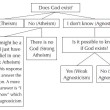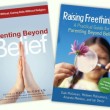Why Believe?
by Carl Olson
Filed under Belief, Faith, New Atheists

"Faith is always at a disadvantage; it is a perpetually defeated thing which survives all of its conquerors," wrote G. K. Chesterton. Faith is the Christian word. Avery Cardinal Dulles, S.J., in his masterful theology of faith, The Assurance of Things Hoped For, writes, "More than any other religion, Christianity deserves to be called a faith". He points out that in the New Testament the Greek words for "faith" and "belief" occur nearly 500 times, compared to less than 100 for "hope" and... Read More
The Common Consent Argument for God
by Dr. Peter Kreeft
Filed under The Existence of God

This proof for God is in some ways like the argument from religious experience and in other ways like the argument from desire. It argues that: Belief in God—that Being to whom reverence and worship are properly due—is common to almost all people of every era. Either the vast majority of people have been wrong about this most profound element of their lives or they have not. It is most plausible to believe that they have not. Therefore it is most plausible to believe that God exists. Everyone... Read More
Varieties of (Non)Belief
by Paul Rimmer
Filed under Belief

NOTE: Today we share a guest post from one of our non-theist commenters, Paul Rimmer. Does the world need another article on how to define atheism? Does Strange Notions? These questions had to open the article, in part because there have already been several different Strange Notions articles on how to define atheists, including the most recent article about self-identified atheists who believe in God. Yet here I am, talking about how to define the terms “atheist”, “theist”,... Read More
Is Atheism a Belief or a Lack of Belief?
by Trent Horn
Filed under Atheism

When asked to prove atheism is true, many atheists say that they don’t have to prove anything. They say atheism is not “belief there is no God” but merely “no belief in a God.” Atheism is defined in this context as a “lack of belief” in God, and if Catholics can’t prove God exists, then a person is justified in being an atheist. But the problem with defining atheism as simply “the lack of belief in God” is that there are already another group of people who fall under... Read More
Is It Possible to Raise Your Kids to Be Open-Minded About Religion?
by Jennifer Fulwiler
Filed under Belief

In my part of the country, it's common to raise your kids to be "open-minded about religion." I know quite a few parents who are taking this route, and it seems to be a more and more popular choice every year. I've always respected the sentiment that drives this decision. The parents I know who want their children to be open-minded in this area typically seem to do so out of a desire to respect different viewpoints, and a hope that their children will think for themselves rather than... Read More
Philosophy, Evidence, and Faith: The Conversion of John C. Wright
by John C. Wright
Filed under Conversion, Faith

On Easter 2008, the renowned sci-fi writer John C. Wright entered the Catholic Church after a lifetime of atheism. This is his conversion story: My conversion was in two parts: a natural part and a supernatural part. Here is the natural part: first, over a period of two years my hatred toward Christianity eroded due to my philosophical inquiries. Rest assured, I take the logical process of philosophy very seriously, and I am impatient with anyone who is not a rigorous and trained... Read More
Should children decide their own beliefs?
by Devin Rose
Filed under Uncategorized

I grew up in a home where my mother and father, both fallen-away Christians, wanted to let my sister and I “decide our own beliefs.” The idea, of course, is that we are blank slates and my parents would not indoctrinate me into a particular religion, thus letting me collect data and inputs over time and eventually grow up and choose my own beliefs or worldview. I can see how someone would think this makes sense. But in fact my sister and I both became agnostics, mirroring the (un)belief... Read More






